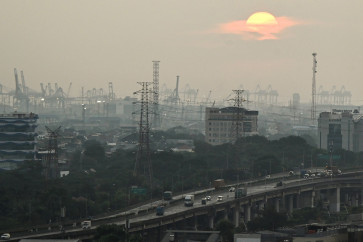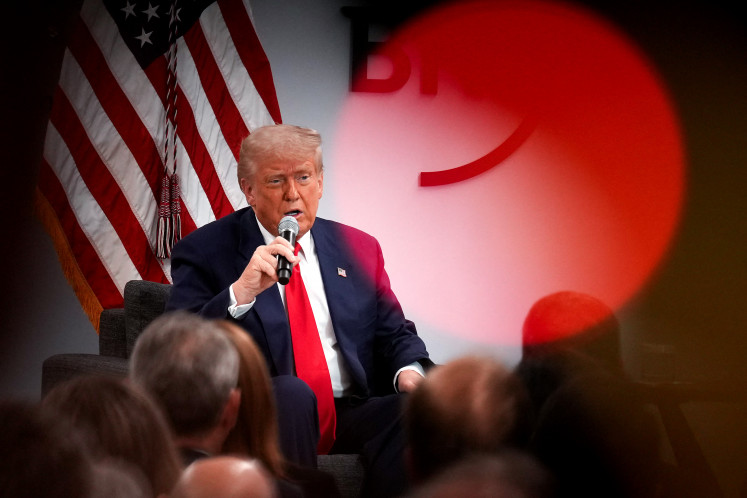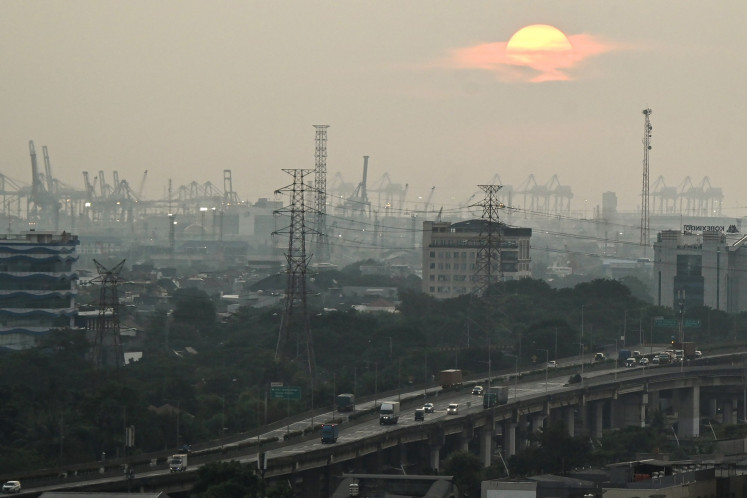Carbon tax, despite paltry rate, has businesses on edge
Change text size
Gift Premium Articles
to Anyone

T
he government will use tax policies to fight climate change by putting a price on carbon emissions, but businesses have expressed opposition while experts say the provisions will hardly get Indonesia closer to its climate goals.
The Harmonized Tax Law (HPP) passed on Oct. 7 introduces a carbon tax with a rate slightly above the carbon price in the domestic market but with a minimum rate of Rp 30,000 (US$2.10) per ton of carbon dioxide equivalent (CO2e). It will be implemented under a cap-and-trade scheme.
Under the new policy, companies exceeding the emissions threshold are subject to the tax unless they buy carbon credits – a tradable permit to release emissions up to a certain limit – from companies with emissions below the cap that are willing to sell some of their unused allowance.
The policy will be enforced solely on coal-fired power plants (PLTU) beginning in April 2022 and applied to other sectors in a full-scale carbon trading scheme only in 2025.
“This will be done very carefully and gradually, based on the development of the carbon market in Indonesia and the progress on our nationally determined contributions (NDC) target,” Finance Minister Sri Mulyani Indrawati told the reporters via live broadcast on Oct. 7, adding that the government had discussed this with business leaders.
Read also: New carbon tax signals higher power costs amid calls for clarity
Sri Mulyani made no mention of Article 5 in the carbon tax segment of the new law, which mentions the taxation of goods – purchased domestically or imported – and activities that involve carbon emissions. The ministry’s Fiscal Policy Agency (BKF) had yet to respond to The Jakarta Post’s inquiries.
With the new legislation, which comes just weeks ahead of the 2021 United Nations Climate Change Conference, or COP 26, the country joins others that have established carbon trading markets, including China earlier this year.
While billed as a response to climate change, the carbon tax introduced in Indonesia through the new law also aims to increase state revenue to bring the fiscal deficit back below the long-term threshold at 3 percent of GDP in 2023.
“A carbon tax will increase the cost to generate electricity (BPP), and with the current tariff scheme it will of course correlate with subsidies and compensation,” Bob Saril, director of commerce and customer management at state-owned electricity company PLN told the Post on Friday.
Bob said most coal-fired plants in the company used "the latest technology" to minimize carbon emissions and it was looking to implement carbon capture, utilization and storage (CCUS) technology.
Aromatic and Plastic Industry Association (Inaplas) secretary-general Fajar Budiyono and Indonesian Association of Synthetic Fiber Producers (APSYFI) secretary-general Redma Gita Wirawasta both told the Post on Friday that they opposed the carbon tax, arguing it would lead to an electricity price hike that could be burdensome for industries.
Fajar said a rise in the electricity price, which accounts for 80 percent of [the industry’s] expenses, would increase production costs and could lead to price hikes for consumers, rendering their product less competitive and possibly disrupting exports.
“If the derivative regulations are not pro-industry, we could file a lawsuit so it would be revoked,” Fajar said, adding that the government should discuss its road map and derivative rules with industry.
APSYFI’s Redma said emission reduction investment was costly, and should the government expand the policy to other industries, they would be less than enthusiastic about the carbon trading scheme, as the tax payable for excess emissions was deemed quite low.
“I think we’d rather pay [the tax], despite that increasing production costs and retail prices,” Redma said.
Indonesian Employers Association (Apindo) chairman Hariyadi Sukamdani also voiced concern. “Now, is the government ready? Shifting to renewables costs a lot. If [that cost] is passed through to the public, how will the public bear it?” he told the Post on Oct. 4.
Institute for Essential Services and Reform (IESR) executive director Fabby Tumiwa told the Post on Friday that the costs of the carbon tax should not be passed on to the public, as that would run counter to behavioral change among corporations.
“This would make the program ineffective,” Fabby said, adding that the government should learn from the European Union’s Emissions Trading System (ETS) that prohibits such practices.
Adhityani “Ditri” Putri, executive director of energy transition NGO Indonesia Cerah, added that, without proper safeguards, the policy could do more harm than good for the state budget, as Indonesia’s power sector was heavily subsidized, so passing on the carbon tax could inflate energy subsidies.
“We don’t want the power plants to simply pay the tax. We want them to actually undertake measures to reduce emissions,” Ditri told the Post on Sunday.
Read also: Indonesia’s carbon tax plan: Will it fix the budget, the climate or neither?
Both Fabby and Ditri noted there was a lot to do to ensure the carbon market served its purpose.
IESR’s Fabby said the government needed to consider a higher penalty for companies failing to comply with the emissions cap to the point that it could ensure carbon trading and emission reduction efforts were more profitable than business as usual.
The highest penalty at 100 euros ($116.20) per ton of CO2e in the EU’s ETS makes Indonesia’s minimum tax at $2.10 per ton CO2e look negligible.
Meanwhile, Indonesia Cerah’s Ditri added that carbon trading should be implemented with a clear sectoral reduction target communicated to all actors and carbon emitters in the sectors. “Those targets are currently missing,” Ditri said.
On top of that, a clear legal and institutional framework – including a presidential regulation on the economic value of carbon – was needed to ensure Indonesia’s carbon market could function properly, as that would involve the transaction of invisible and intangible goods that required thorough verification so that a transaction can occur and be accepted by all parties, she said, whereas the country was known for a lack of monitoring and assessment capability.









